'We've been rescuing and rehoming cats for 100 years'
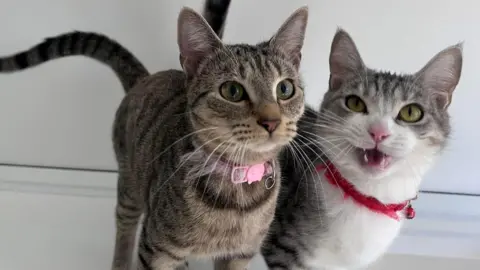 Animal Welfare Suffolk
Animal Welfare SuffolkFrom the outside, it looks like any other terraced house, but behind the front door the Ipswich & District Animal Welfare Centre has provided a sanctuary for countless cats for 100 years. At a time when many sanctuaries are struggling to stay afloat, how has it kept going for an entire century?
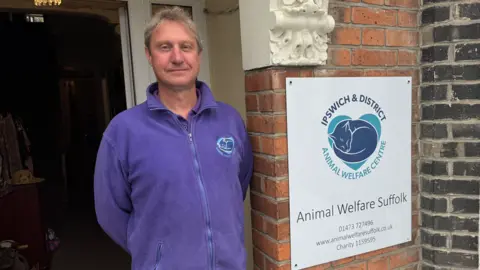 George King/BBC
George King/BBCThe Tardis-like house in the east of the town was opened for animals in 1925 by Margaret Payne.
The site, which is run by the Animal Welfare Suffolk charity, boasts 18 state-of-the-art kennels and an outdoor area for feral felines, at times caring for as many as 35 cats or kittens.
Since 2012, it has been operated by a family which had been heavily involved with it for decades before taking over.
A key to its longevity is "the fact we've been on the same site for 100 years, with people who have been here for 30 to 40 years," said the charity's chief executive Nick Chaplin.
"You can still come in and talk to people who remember your family and the cat you took from us 25 years ago, so it has a long historical link to people within the community," he said.
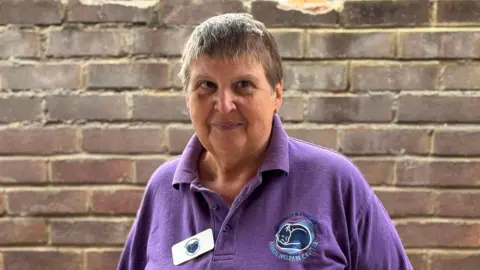 George King/BBC
George King/BBC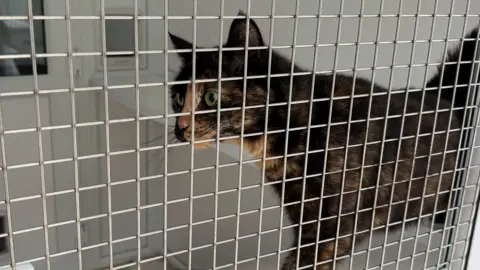 George King/BBC
George King/BBCOne of the dedicated volunteers and workers is centre manager Suzanne Tripp, who has been there for 28 years and said she treated every cat as if it were her own.
She said animals were often handed into the facility in a "very poor condition" - a reoccurring sight that she said only spurred her on.
"We had a kitten in that had to have a leg amputated and we were told it had fallen off a sofa," she said.
"Well unless the sofa was on the roof then, no, it had been ill-treated.
"We would rather have the cats here than have people not care for them, so it's so satisfying to see them go out to new homes happy, fed and with glossy coats."
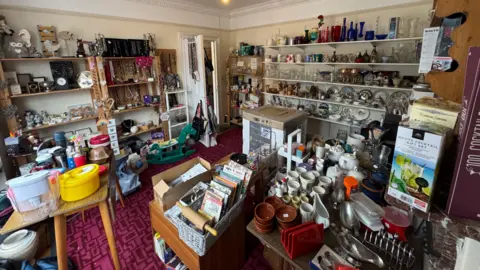 George King/BBC
George King/BBC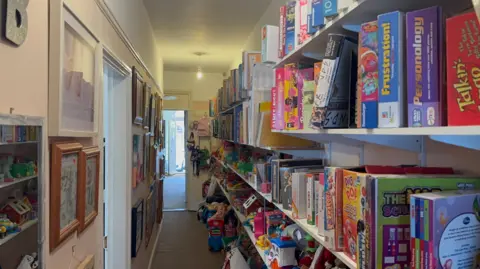 George King/BBC
George King/BBCThe rescue centre also features a charity shop, with bric-a-brac, board games, ornaments and more taking over the front room and the lengthy hallway.
All of the money raised covers the cost of everything from a vaccination to a heating bill.
It is an additional revenue stream at a time when independent animal sanctuaries across the UK are struggling to stay open.
In February, for example, the BBC reported how the Friends of Felines animal charity was at risk of closure after racking up a vet bill for £7,000.
The site in Halstead in Essex, which cares for cats from across the East of England, said bills had trebled over Christmas due to the number of elderly cats it took in, as well as those suffering from a viral disease.
Back at the Ipswich centre, while the income from the shop helped, Mr Chaplin admitted it was far from enough.
"Every cat we look after costs about £1,000 before it is rehomed," he said.
"The whole place costs just over £100,000 a year, so we do need donations all the time.
"We are quite fortunate that we have had people give us significant sums over the years; some years we will get £40,000 to £50,000, and other years we will get multiple hundreds of thousands.
"So, it does balance out, but that's over the years, not in any given year."
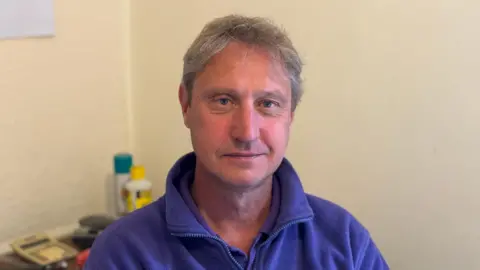 George King/BBC
George King/BBC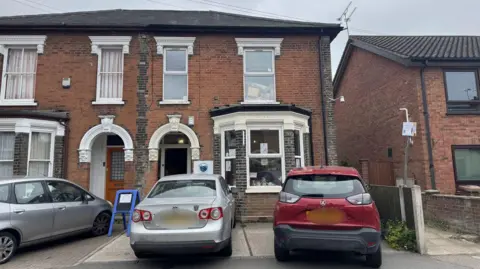 George King/BBC
George King/BBCThe sanctuary also puts on an in-house animal clinic once a week to ensure that all pet owners in the area, regardless of their financial situation, can access veterinary care or advice at a fraction of the market price.
It has proven a priceless service for so many at a time when the cost of vet care is surging.
According to the Competition and Markets Authority (CMA), for example, prices for vet treatments grew by 60% between 2015 and 2023, compared with the general inflation rate of 35% over the same period.
Last month a BBC investigation found some vets felt they were under pressure to "generate income" and more money per pet.
But could vet practices themselves being doing more to drive down the cost of care?
Mr Chaplin is not so sure they could.
"I work with a lot of vets and I don't think they overcharge," he said.
"The costs of medication have gone up a huge amount and the amount they have to pay their staff has gone up.
"I know from the ones that we work with they do their best."
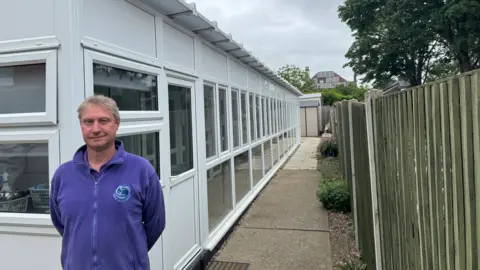 George King/BBC
George King/BBCTo celebrate the sanctuary's 100th anniversary, a Spring Fair Birthday Party and open day will be held on Saturday at the centre on Cauldwell Hall Road, giving people the chance to see exactly what makes it so special.
But what does it mean to Mr Chaplin?
"An enormous amount," he said.
"My parents were here for a long time and my mum loved the place.
"I remember being here when I was 14 playing with the cats. I know how much good it does and how good a place it is."
Follow Suffolk news on BBC Sounds, Facebook, Instagram and X.
